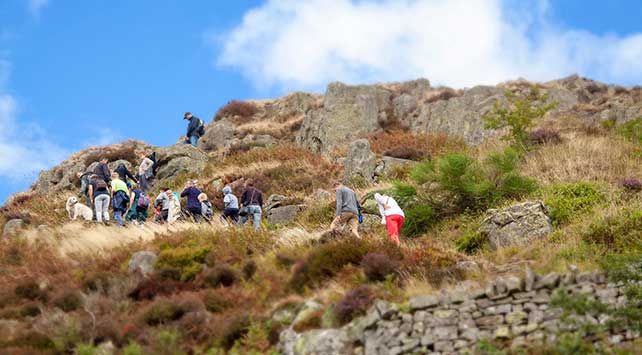MSc Leadership in Climate Change and Sustainability
Tackling Climate Change and building sustainable approaches through interdisciplinary collaboration and leadership
About the programme
Gain a comprehensive understanding of climate change and develop the professional skills needed to influence and lead on sustainable climate action.
On our Leadership in Climate Change and Sustainability MSc programme you'll gain a deep insight into climate change's impact on society, organisations, and individuals. You'll explore sustainable approaches to tackle climate change and other negative human impacts on the planet.
The programme has 3 distinct themes:
- Interdisciplinary and collaborative approaches
- Learning through live projects
- Development of personal agency and leadership roles
Aligned with Newcastle University's own sustainability goals, you'll study global solutions, enhance personal growth, and refine your leadership skills.
Together, we'll explore ways to create meaningful responses within the finite resources of the planet.
Programme content
We'll equip you with the essential knowledge and insights to address global climate challenges.
Throughout the programme, you'll:
- Analyse and assess scientific theories on climate change and sustainability from authoritative sources
- Examine social, cultural, and economic aspects related to these topics
- Prioritise and confront challenges in real-life situations, employing an interdisciplinary approach
- Acknowledge the demands and possibilities of responsible leadership for sustainable practices
Key features
The programme is co-curated by five dedicated Climate Change Fellows, all with different academic backgrounds and disciplines from four departments: engineering, history, urban planning, science and business.
Emphasising an interdisciplinary, applied approach, our programme combines elements such as:
Live project-based learning
All modules influence and support the live project module. You'll work together to address real-life themes set by external organisations, supported by top researchers and Climate Change Fellows.
Interdisciplinary team teaching
You'll be tutored by the Climate Change Fellows on the modules ‘Facing up to Climate Change’, ‘Live Project’, ‘Research Dissertation’ and 'Leadership for Climate Change and Sustainability'. You'll explore the diverse approaches, methodologies, and concerns of different disciplines facing the same challenges, enabling you to ‘triangulate’ your own approach.
Engaging with other Master's courses
On the 'Facing up to Climate Change' module (video above) and the elective modules, you'll be able to connect with a variety of disciplines across Newcastle University.
Exploring leadership
You'll focus on personal understanding, exploring and critically evaluating leadership theory and its application within the individual contexts and practices of sustainability and climate change.
Student visits
Through study visits we'll build course community and introduce you to the north-east of England. We'll examine the area's role in the emergence of a coal-based, fossil-fuel economy, which fuelled the industrialisation that led to modern global warming. We'll also study regional efforts to develop sustainable and resilient ecosystems.
Research dissertation
You'll take the knowledge you've gained throughout the programme and apply it to your own project, encouraging you to reflect upon different climate change approaches in diverse cultural contexts.
How you'll learn
The programme mixes lectures, seminars, and collaborative interactive workshops and study trips. Your learning will also be supported with digital content and our online environment.
The interdisciplinary modules on the programme provide:
- in-depth knowledge on climate change
- critical understanding of the evidence and concepts supporting that knowledge
- the research and leadership skills enabling you to come to your own conclusions and to lead your own research project
Our teaching approach blends:
- lectures, seminars and collaborative workshops
- case studies from industry and cutting-edge research
- team projects
- study trips
- independent research
Assessment criteria focus on depth of knowledge, critical analysis, and collaboration across activities including:
- reports
- case studies
- group projects
- reflective essays

This comprehensive approach aims to evaluate knowledge, encourage collaboration, and instil a reflective approach in addressing complex sustainability and climate change challenges for responsible, proactive leadership.
Graduates leave equipped with a diverse skill set combining theory, application, collaboration, and critical thinking for success in academia and professional endeavors.
Employability skills
Many of the skills that you'll learn on this programme are not only useful within the context of tackling climate change, but are transferrable. Such as:
- Leadership, collaboration, and teamwork
- Ability to work at pace
- Critical thinking, problem solving, creativity and imagination
- Global and cultural awareness and the ability to adapt to other cultural perspectives
- Oral and written communication skills
- Research methods and skills
- Systems thinking and anticipatory thinking
- Self-awareness
An interdisciplinary approach provides a more enduring understanding of climate change, drives innovation in mitigating complex climate challenges and cultivates strong future leaders who can encourage collaboration across all sectors.
